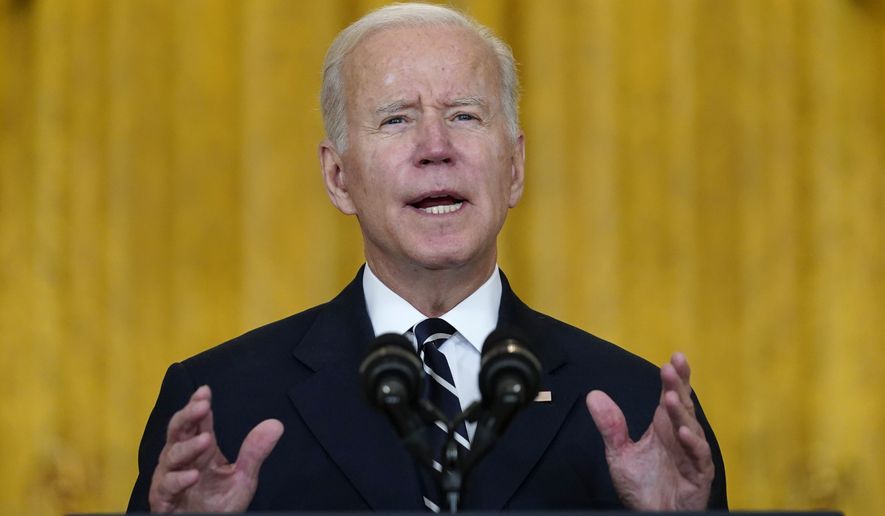President Biden on Thursday made a pitch to the American people for a slimmed-down $1.75 trillion social spending and climate bill in a new bid to save his teetering agenda.
With support among Democrats on Capitol Hill still unsure, Mr. Biden made his case directly to the nation from the White House. He said a framework of the proposal unveiled earlier by the White House was “historic.”
“It is a framework that will create millions of jobs, grow the economy, invest in our nation and our people,” Mr. Biden said. “It’s fiscally responsible. It’s fully paid for.”
He made the sales pitch ahead of his four-day trip to Europe, where he’s scheduled to attend a meeting with G20 leaders and the United Nations climate conference known as COP26. He delayed his departure by several hours so he could make a last-ditch effort to sell the plan to deeply divided Democrat lawmakers.
Mr. Biden acknowledged that the new proposal is smaller than the $6 trillion progressives had sought and the $3.5 trillion he initially proposed.
“No one got everything they wanted, including me, but that’s what compromise is. That’s consensus. And that’s what I ran on,” he said.
Mr. Biden emphasized that the current framework was the result of compromise, urging progressive and moderate Democrats to rally around it.
“These are not about left versus right or moderate versus progressive or anything else that pits Americans against one another,” he said. “This is about competitiveness versus complacency. It’s about leading the world or leading the world pass us by.”
Despite the plea, Mr. Biden offered no details on how will get the latest framework across the finish line. Moderate Democrats in the Senate have not indicated if they will support the framework and progressives are skeptical.
He urged lawmakers to adopt his framework because the voters who elected him are demanding it. He said it was “what 81 million Americans voted for.”
“Their voices deserve to be heard, not denied, or worse, ignored,” Mr. Biden said.
The framework includes the largest expansion of federal health care coverage since the Affordable Care Act and would reduce premiums for more than 9 million Americans.
It also includes a one-year extension of the expanded child tax credit through 2022 and a provision that would make the credit permanently available to low-income families that don’t pay income taxes.
The new framework also sets aside $150 billion to support long-term care for elderly and disabled Americans, six years of universal pre-kindergarten, and six years of child care subsidies.
More than $555 billion will be set aside for provisions combatting climate change, including $320 billion in 10-year expanded tax credits for renewable energy, electric vehicles and clean energy manufacturing.
The massive spending bill will be funded with a potential surtax on wealthy Americans’ income.
“Pay your fair share. Pay your fair share,” he said, repeating the far-left mantra for effect.
A 5% surtax will be imposed on adjusted gross income above $10 billion and another 3% on adjusted gross income over $25 million. The framework also calls for a 3.8 percent investment-income tax on active business income.
The plan also proposes a 15% minimum tax on profitable corporations and higher taxes on U.S. companies’ foreign income.
Another $100 billion is earmarked to reduce immigration backlogs, expand legal representation and bolster the border processing system.
Several key provisions favored by progressives were not mentioned in the scaled-back framework. A White House official cautioned Thursday that the framework was not a final bill and some provisions could be added during negotiations with Congress.
Mr. Biden did not discuss the omissions in his remarks.
The new proposal did not include a plan to create a national paid leave program. Democrats had sought 12 weeks of paid family leave, but last week Mr. Biden acknowledged that had been whittled down to four weeks.
The bill also left out the Clean Electricity Performance Program, which Mr. Biden touted as a way to reduce U.S. emissions.
A plan to allow Medicare to negotiate drug prices, a top priority of Sen. Bernard Sanders, Vermont independent, was also not included in the White House plan.
• Jeff Mordock can be reached at jmordock@washingtontimes.com.




Please read our comment policy before commenting.